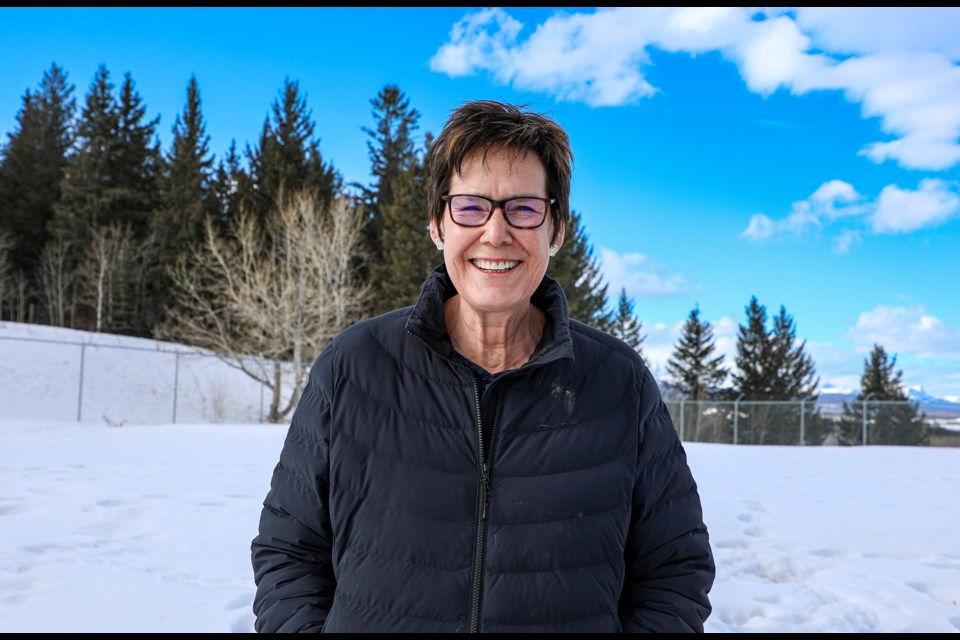CALGARY – Terry Poucette was raised by a strong Îyârhe (Stoney) Nakoda woman, so it’s only fitting she is now the director of the Kiipitakyoyis, or Grandmother’s Lodge, at the University of Calgary.
The Blackfoot-named lodge’s primary purpose is to recruit and retain Indigenous students, faculty and staff by creating a sense of belonging and community at the university.
“My whole thing is to help train decolonizers and healing supporters of tomorrow, so I think I’m in the right place to do that,” said Poucette.
“Now I’m in a position where I can help social work graduates – whether they’re Indigenous or non-Indigenous – contribute to the recovery of Indigenous peoples from the effects of colonization, to recover and heal from the effects and to rebuild ourselves in our communities.”
The lodge was created in 2020 to enhance the learning journey of Indigenous social work students by providing elder and counselling supports, ceremonies and cultural activities. It’s also led by Métis and Cree elder Kerrie Moore and advisor Deandra Neufeld.
As a student of post-secondary for about 15 years, Poucette understands the university experience better than most.
“Sometimes universities can be a really alien place for Indigenous people because they’re colonial institutions. This lodge creates a sense of belonging and helps to nurture Indigenous students and create relational spaces for students,” she said.
When she was a young girl, Poucette’s mother, Tina Fox, who is a renowned elder in the Îyârhe Nakoda community, insisted she and her siblings obtain a university education.
“Education was used to colonize Indigenous people through residential school and other avenues, but in current day, I think that a lot of Indigenous people realize that education can also be used to help our communities recover from the legacy of colonization, and to decolonize and to rebuild,” said Poucette.
These principles led Poucette to obtain a diploma in social work from Monroe College, which she used to run social programs like the Eagle’s Nest Stoney Family Shelter in Mînî Thnî and as assistant director of Stoney Nakoda Child and Family Services Society.
In pursuit of higher education, she later moved to B.C. with her son, two dogs and cat in tow, and from Vancouver Island University, she obtained a bachelor’s degree in First Nations Studies, followed by a master’s and PhD in public administration.
Poucette’s dissertation delved into effective governance within First Nations communities, affording her insights from leaders, administrators, elders, and community members. She examined both the successes and challenges of public administration within the framework of the Indian Act.
Some of this was inspired by watching her mother become the first woman ever elected to Stoney Tribal Council in 1976, where she served as a councillor on and off for 14 years.
“The reason I went into public administration was because through the colonization process, Indigenous peoples education levels have been impacted severely by colonization and so a lot of times, our administrations and our businesses are run by non-Indigenous people because we don’t have that level of education,” said Poucette.
“I always believed that as Indigenous people, we’re highly intelligent and can run our own stuff, so that’s what prompted me to go into administration management.”
Before becoming director of the Kiipitakyoyis, Poucette led the City of Calgary’s Indigenous relations office from its inception in January 2020 up until recently accepting her new role at the university. She’s also joining the institution as an associate professor of social work, having previously worked there as an associate professor in public administration, as well as at the University of Victoria.
Poucette insists she didn’t “plan to go back to academia” rather “academia reached out to me.”
“I started off my career and education in social work, and so it’s really come full circle for me and now I’ve gone back to it,” she said.
The Kiipitakyoyis aims to foster Indigenous education and knowledge, providing learning opportunities for all faculty, staff and students about histories, cultures, languages and teachings. It also aims to decolonize spaces, aligned with the university’s ii’ taa’poh’to’p principles, honouring Indigenous ways of knowing.
In 2022, Blackfoot elder Dr. Clarence Wolfleg from Siksika Nation named what was formerly known as the Indigenous Social Work Circle and Lodge, Kiipitakyoyis, symbolizing the essential guidance provided by grandmothers in lodges or encampments.
Poucette said she is honoured to be part of the lodge’s important work, which includes helping the social work faculty develop an Indigenous strategy.
“I think we can have a real impact,” she said.
The Local Journalism Initiative is funded by the Government of Canada. The position covers Îyârhe (Stoney) Nakoda First Nation and Kananaskis Country.




